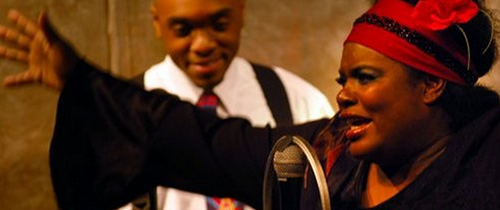“All the boys in the neighborhood
They say your black bottom is really good
Come on and show me your black bottom
I want to learn that dance” — Ma Rainey’s “Black Bottom.”“Maybe it just sags
like a heavy load.Or does it explode?” — Langston Hughes, “A Dream Deferred”
In every production of Ma Rainey’s Black Bottom I’ve ever seen— including the one currently on stage at The Hattiloo — the acting has been low key, verging on cinematic. The material is given the straight Checkhovian treatment even though the play often reflects the sensibilities of experimental dramatists like Bertolt Brecht and Jean Paul Sartre by way of Douglas Turner Ward. Huge passages of the script play out like an angry, American answer to Samuel Beckett’s Waiting for Godot, and if Ma Rainey is actually about anything, it’s about waiting, a key feature of African-American oppression that can be found everywhere, from bondage to Booker T. Washington’s accommodationist philosophy, to revisionist historians who still insist that slavery would have ended naturally, without federal intervention or war.
Of course there can be no waiting without the presumption that something is going to happen: emancipation, equality, opportunity, etc. In this case the band waits for Ma Rainey, Ma Rainey waits for her Coca-Cola, and the white management waits to get on with the business of building Paramount Records.
Ma Rainey’s Black Bottom isn’t much of a story in and of itself, but it’s filled with stories and storytelling. It’s a play built out of bits, pieces, full of con games, clown shows, and hard lessons about the difference between real power and bullshit. The best one sentence summary I can offer: A white man gives a black man a dream and that dream deferred destroys the lives of two black men.
Rainey isn’t the star of this play. She’s the side show attraction, bossing around the white management, like they weren’t exploiting the hell out of her. Her musicians, $25-a-day session players all, are the rubes at this carnival, who are kept in suspense by the management, and finally brought in to view the marvel when it’s time to record.
The major characters aren’t what you’d call positive role models. Rainey got her start singing in minstrel shows and like Brecht and Beckett who took some of their inspiration from cabaret performances, Wilson seems to have borrowed from negative stereotypes common within the minstrel tradition. His musicians can be clownish, but are infused with just enough hardscrabble humanity to give them dimension, as they drink, dope, brag, and generally avoid the business of getting down to business. They speak nonsense and wisdom in equal measure then argue over which is which. Ma Rainey’s Black Bottom shouldn’t be regarded one of Wilson’s most accessible plays. It’s not a “VH-1 Behind the Music”-style documentary for the stage. It’s a savage cartoon about whites effortlessly manipulating African Americans, and the African Americans who unwittingly, play right into their hands. It should be garish, and obvious to everybody but the players.
There’s nothing wild going down at the Hattiloo. Aside from Valerie Houston’s blazing star turn as Rainey, everything is a little too cool for school. The acting is fine, the design for the crummy recording studio looks like a crummy recording studio. All things considered, it’s not a bad night of theater. But without an edge, material that should smack us out of our work-a-day stupors just lays there.
The Hattiloo’s multitalented founding director Ekundayo Bandele doesn’t get on stage too often, and when he does it’s usually a special occasion. This time, not so much. His character Levee is, in some regards, like Brooklyn hipsters of today, who mostly migrated from somewhere else and are trying so hard to walk, and talk like the authentic embodiment of their adopted home that they end up looking ridiculous. Bandele’s Levee doesn’t hide his country roots and comes across a lot like the slow-talking man-child he portrayed in his own play Judas Hands. It’s the artist’s first real miss and his least interesting performance since he took on Stanley Kowalski in A Streetcar Named Desire.
The song in question…
Complaints aside, if you miss Houston as Rainey, you’ve missed what will surely be counted among the finest performances of the season. She’s an Ostrander contender, for sure.
For tickets, click.
